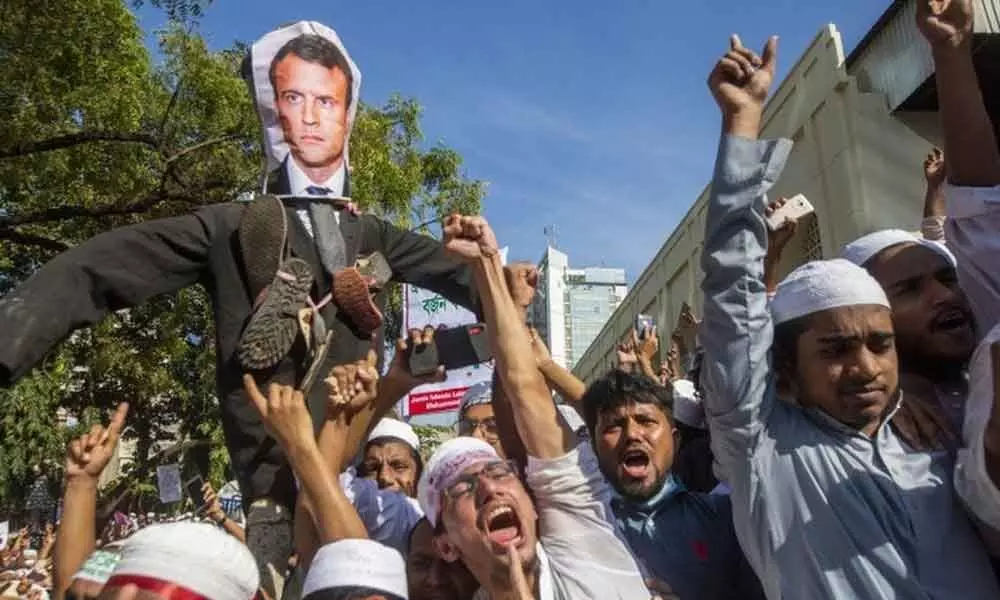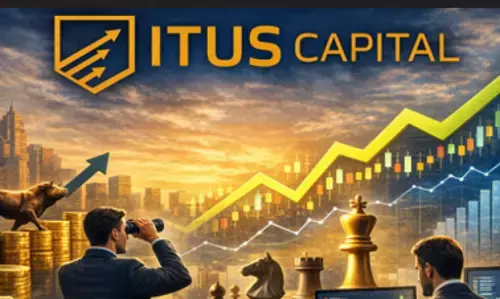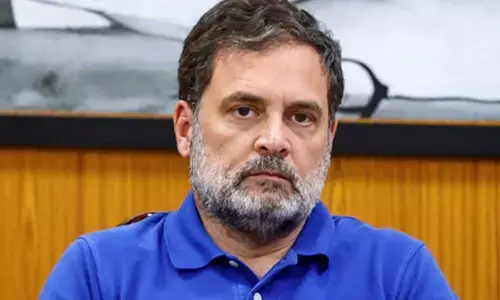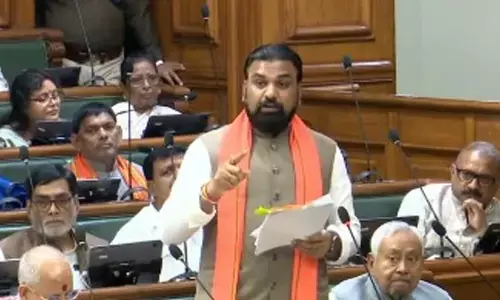A disturbing polarisation

A disturbing polarisation
The beheading of a school teacher in a Paris suburb on October 16 -- by a religious fanatic who was out to 'punish' the victim for showing a published cartoon of Prophet Mohammad during his class on social education
The beheading of a school teacher in a Paris suburb on October 16 -- by a religious fanatic who was out to 'punish' the victim for showing a published cartoon of Prophet Mohammad during his class on social education -- has reenacted the brutal killing of a dozen employees of Charlie Hebdo, a Paris based magazine, which was carried out by two heavily armed Muslim brothers affiliated to Al Qaeda in 2015 on the same count.
President Emmanuel Macron has responded by ordering the closure of a mosque to which the offender -- an 18-year-old Chechnian Muslim -- was linked and called the horrific crime a test for the nation's resolve to assert freedom of speech against religious intolerance.
He declared that there will be no prohibition on such cartoons and a number of protest processions that followed the Paris killing therefore did carry the cartoons.
In a cycle of action and reaction, another incident occurred in Nice on October 29 in which an Islamic extremist beheaded a woman and killed two other French citizens attending a church. The attacker reportedly shouted 'Allahu Akbar' even after he was shot and arrested. The Mayor of Nice was quick to call for total elimination of Islamic fascism from France.
Some geo-political developments in the wake of the Paris murder are beginning to lay the seeds of a global polarisation between the 'Muslim world' and the secular democracies across the continents that were broadly against the idea of religious diktats curbing the freedom of expression of the people at large. India has promptly condemned the Paris killing and stood by President Macron and his tough response to these ghastly acts of violence. It is a matter of grave concern for all peace loving nations that the world lately was moving in the direction where radicalisation of Islam would precipitate conflicts that might trigger a war-like situation at the global level.
The Paris beheading underscores the need for a democratic state to legally prohibit any act that would create enmity between communities, but at the same time it must also set an example of how a deliberate brutal killing of this kind must lead to capital punishment -- whatever be the nature of defence put up.
In this context, 9/11 can be said to have provided the cut off point for the world to have transited to a new era where larger conflicts would arise from what Samuel Huntington and Barnard Lewis -- both associated with the National Security Council of the US at that time -- described as a 'clash of civilisations'.
The war on terror that followed 9/11 -- first in Afghanistan and then in Iraq -- was in effect a combat between the US-led world coalition and the forces of radical Islam led by Al Qaeda and ISIS which had substantive support coming in for them from within the Muslim world.
There are reasons to apprehend that these incidents could foretell an escalation of faith -- based terror across the world unless there was an express consensus in the Islamic world -- possibly voiced at the Organisation of Islamic Conference(OIC) led by Saudi Arabia that resort to Jehad for avenging a perceived attack on Islam was not necessary or even valid in today's times and that political disputes involving a Muslim country had to be resolved without invoking questions of faith.
This may not happen and therefore the danger from radicalised Islam that rejects any separation of religion from politics might grow large enough to pose a threat to world peace and stability.
It has to be noted that Islamic radicals of today carry the historical legacy of the first Jehad in modern history that was launched by the leading Ulema in Algeria, Arabia and India in the middle of the 19th century against the Western encroachment on Muslim lands -- they called for going back to the puritan Islam of the days of the Pious Caliphs as their contention was that the political decline of Islam was caused by the deviation of Muslim rulers from that original path. 'Revivalism' is thus the hallmark of radical Islam and enmity towards the US-led West the prime motivation that drives it. Shias and the idol- worshippers come on its hit list too.
Europe is associated with colonialism and it is the presence of Muslims there in large numbers -- they are migrants from the former colonies -- that has allowed Islamic radicalism to strike roots in many of the European countries post 9/11. The attack on Twin Towers could be easily traced to the ouster by the US of the Afghan Emirate led by Taliban-Al Qaeda combine that had been installed in Kabul by Pakistan in 1996 but had soon started showing its fangs against the West.
Perhaps the most striking evidence of the impact of history on Islamic radicals of the present was seen in the terrorist bombings at Brussels in 2016 where the attackers left behind a leaflet claiming that the bombings were in revenge for the Crusades - Belgium is known to have led that crucial long war to oust Muslims from the Christian Holy Land.
On the Indian subcontinent that 19th century Jehad was led by Shah Waliullah a follower of Abdul Wahab and the epicentre of that prolonged combat- termed as 'Wahabi Revolt' by the British -was located in what is now Khyber Pakhtunkhwa of Pakistan- it left the NWFP-Afghanistan belt totally radicalised consequences of which can be seen even today.
The protagonists of this failed Jehad established Darul Uloom Deoband in 1867- an institution that ran Deobandi madrasas all over India to teach puritan Islam and after Independence stayed away from politics while retaining its anti-West bias.
In Pakistan the products of these madrasas called Taliban were politically used by that country to take control of Kabul amid the chaos that prevailed in the post Soviet-Afghanistan conflict and that is how the Taliban with support from Osama bin Laden's Al Qaeda established the Afghan Emirate in Kabul in 1996.
From India's point of view, Pakistan never had any scruples about joining up with Islamic radicals who happen to constitute a significant arc of the Islamic spectrum across the Muslim world- it is the US policy makers who had continued to pamper Pakistan even after the Cold War had ended following the dismemberment of USSR.
This was because India-Pakistan hyphenation still dominated their thinking. They made an artificial distinction between 'good terrorists' and 'bad terrorists' in the context of cross border terrorism that Pakistan had launched against India using the battle-hardy Mujahideen as its instrument to replicate the Afghan Jehad in Kashmir.
Subversion in Kashmir was -- since the early '90s -- being done on the war cry of Islam and not so much on the political slogan of Plebiscite or Azadi used earlier. Forced ouster of Pandits was part of the Pak-sponsored plan of Islamisation of the Valley. Right through the Obama regime, the US administration looked differently at militants of HuM, LeT and Jaishe Mohammad controlled by Pak ISI - who were specifically set upon India - from the Islamic radicals of Al Qaeda and Taliban who considered the West as their first enemy but enjoyed a comfortable relationship with the Pak establishment.
It is in the Donald Trump regime that the Pak duplicitousness about Islamic terror was exposed and the US President's visceral dislike of Islamic extremism led him to abandon the 'good terrorists-bad terrorists' line and call out Pakistan for sheltering Islamic terrorists of all hues on its soil.
US supported the move to proclaim Syed Salahuddin, Hafiz Sayeed and Masood Azhar as international terrorists. Under Prime Minister Imran Khan, Pakistan has clearly chosen to take the side of Islamic radicals against the US with Imran even declaring openly that it was a mistake on the part of Pakistan to be with Americans in the 'war on terror'.
Significantly Pak agencies around this time created Al Qaeda in Indian Subcontinent (AQIS) under one Asim Umar a former commander of Tahrik-e-Taliban, to join in the proxy war against India. While US-India convergence on opposition to Islamic terrorism strengthens India's hands against Pakistan it is also a fact that unlike the US India does not have the comfort of distance on this threat and must strategise to deal with it on its own. The military and operational collusion between Pakistan and China has added to this challenge facing India.
In the backdrop of a polarisation between the US -led West and its supporters on one hand and the Islamic radicals and their sympathisers in the Muslim world on the other- triggered by the two theatres of 'war on terror', Afghan-Pak belt and the Syria-Iraq region, the emergence of the trio of Pakistan, Turkey and Malaysia that is questioning the US and upholding the cause of radicals, looks like a development of considerable geo- political significance.
Turkish President Erdogan, Pak Prime Minister Imran Khan and former Prime Minister of Malaysia Mahathir Mohamad have denounced French President Macron for 'hurting the sentiments of Muslims' by criticising Islam - they maintained complete silence on the ghastly crimes committed by fanatics in France in the name of religion. Imran charged France with spreading Islamophobia - he is trying to emerge as a leader of the Muslim world to gain some traction in domestic politics.
Clearly within the Islamic world radicalisation is being upheld by a growing number of Muslim countries and the friends of US - Saudi Arabia and its close allies in the Gulf - seemed to be in a passive mode as far as the internal dynamics of OIC was concerned.
Nearer home many of the elite and Ulema who had been influencing the Muslims with their communal politics have criticised Modi government for extending support to President Macron's plan of curbing Islamic radicals with a firm hand. India has to watch even more closely the trends of radicalisation developing within the country and in our neighbourhood.
We have to join in the fight of the democratic world against faith-based terrorism, focus on the Pak mischief of fishing in our troubled waters and step up efforts to project India as a democracy that provided equality of rights and same protection of law to all citizens regardless of class, caste and creed - but without permitting the play of minority politics.
(The writer is a former Director of the Intelligence Bureau)








